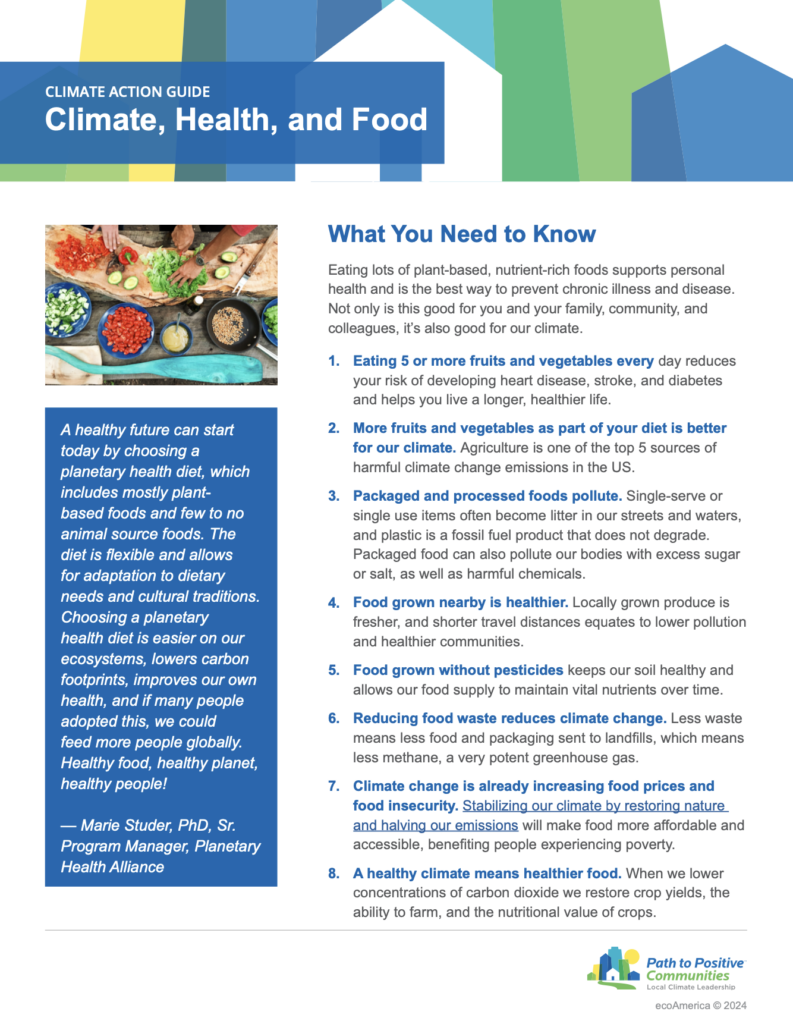Climate, Health, and Food
What You Need To Know
Eating lots of plant-based, nutrient-rich foods supports personal health and is the best way to prevent chronic illness and disease. Not only is this good for you and your family, community, and colleagues, it’s also good for our climate.
- Eating 5 or more fruits and vegetables every day reduces your risk of developing heart disease, stroke, and diabetes and helps you live a longer, healthier life.
- More fruits and vegetables as part of your diet is better for our climate. Agriculture is one of the top 5 sources of harmful climate change emissions in the US.
- Packaged and processed foods pollute. Single-serve or single use items often become litter in our streets and waters, and plastic is a fossil fuel product that does not degrade. Packaged food can also pollute our bodies with excess sugar or salt, as well as harmful chemicals.
- Food grown nearby is healthier. Locally grown produce is fresher, and shorter travel distances equates to lower pollution and healthier communities.
- Food grown without pesticides keeps our soil healthy and allows our food supply to maintain vital nutrients over time.
- Reducing food waste reduces climate change. Less waste means less food and packaging sent to landfills, which means less methane, a very potent greenhouse gas.
- Climate change is already increasing food prices and food insecurity. Stabilizing our climate by restoring nature and halving our emissions will make food more affordable and accessible, benefiting people experiencing poverty.
- A healthy climate means healthier food. When we lower concentrations of carbon dioxide we restore crop yields, the ability to farm, and the nutritional value of crops.

What You Need To Do
We can all eat better, in a way that benefits our health and helps our climate at the same time. Focus on including more delicious and nutritious fruits and vegetables in your diet, today. Share your healthy habits with your neighbors, colleagues, and policymakers
- Eat the rainbow → more fruits and vegetables. It’s not just an apple. Half a plate of fruits and vegetables keeps the doctor away because it’s good for you and good for the planet.
- Eat better protein. Sustainably grown fish and poultry are excellent sources of flavor and nutrition, as are beans and lentils. Shift your meat intake toward white meat and/or plant-based alternatives.
- Eat locally and seasonally whenever possible. Not only is this more delicious, but it’s often more interesting, less expensive, and does not produce excess emissions like food that has to travel farther to your plate.
- Cook and shop with your kids. Kids are more likely to eat fruits and vegetables if they help prepare their meals. Building healthy habits at a young age can last a lifetime.
- Eliminate food waste, which reduces demand on the food system, diverts food from the landfill, and saves you money. Eat what you buy at the store, try growing your own food, and compost the peels and scraps for your garden or a community garden.
- Bring your reusable bags for fruits and veggies in addition to your shopping bags and buy most of your food from the perimeter of the grocery store where all the healthy fresh foods are stored.
- Vote with your dollar by buying foods grown from sustainable and regenerative farming practices, like organic foods, when possible.
- Vote for candidates and policies that support sustainable agriculture, food equity and food access. Talk to your neighbors and community about these actions and opportunities.
We can all eat better, in a way that benefits our health and helps our climate at the same time. Focus on including more delicious and nutritious plantbased foods in your diet, today. Bring your healthy habits to neighbors, colleagues, and policymakers.
Dr. Bhargavi Chekuri contributed to this Action Sheet. She is a practicing family physician and National Climate & Health Science Policy Fellow at the University of Colorado School of Medicine.
“A healthy future can start today by choosing a planetary health diet, which includes mostly plantbased foods and few to no animal source foods. The diet is flexible and allows for adaptation to dietary needs and cultural traditions. Choosing a planetary health diet is easier on our ecosystems, lowers carbon footprints, improves our own health, and if many people adopted this, we could feed more people globally. Healthy food, healthy planet, healthy people!”
— Marie Studer, PhD, Sr. Program Manager, Planetary Health Alliance

